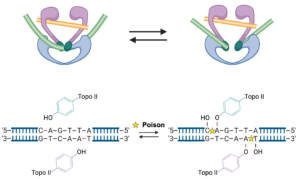Anticancer Drugs and Chemopreventive Compounds
Topoisomerase II is the target for some of the most successful anticancer drugs currently used for the treatment of human malignancies. Approximately one-half of all chemotherapy regimens include agents that target the enzyme.
Drugs that target type II topoisomerases are called topoisomerase II poisons, because they convert these enzymes into potent cellular toxins. Topoisomerase II poisons increase the concentration of topoisomerase-cleaved DNA complexes (cleavage complexes), which are intermediates in the catalytic cycle of these enzymes. As a result, these drugs generate high levels of DNA breaks in the genome that ultimately need to be repaired by DNA damage response pathways or else trigger cell death pathways.

CURRENT PROJECTS ON TYPE II TOPOISOMERASES IN ANTICANCER THERAPY:
- Characterizing the interactions of anticancer drugs (novel and established) and dietary agents with topoisomerase II in vitro and in cellulo.
- Defining the mechanism of action of topoisomerase II-targeted anticancer drugs and natural products.
- Determining the relative contributions of topoisomerase IIα and IIβ to drug cytotoxicity.